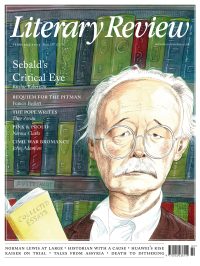Zoe Guttenplan
Who’s Afraid of Virginia Woolf?
Theory & Practice
By Michelle de Kretser
Sort of Books 192pp £12.99
‘She has haunted me,’ Virginia Woolf wrote of her mother in a private letter to Vita Sackville-West in 1927. Two years later, for public consumption in A Room of One’s Own, she wrote: ‘we think back through our mothers if we are women.’ In the first quotation, Woolf is referring to her actual mother. In the second, the ‘mothers’ she mentions are metaphorical. They are the women writers against the pattern of whose prose she might fashion her own. Despite their differences, these Woolfian fragments say much the same thing: the tentacles that tie a daughter to her mother, biological or otherwise, are long and strong.
In Theory & Practice, Michelle de Kretser’s narrator makes a similar point: ‘Who, among everyone on the planet, can we never forgive for a failure of protection? MOTHER. Everything follows from there.’ She is twenty-four and has moved from Sydney to Melbourne, where she is undertaking an MA in English. It is 1986. Her subject is ‘The Construction of Gender in the Late Fiction of Virginia Woolf’ and her supervisor, Paula, is the university’s ‘Designated Feminist’. If Paula were an action figure, her accessories would be a black leather jacket, red lipstick and a library full of Derrida. The narrator finds that the English department has been ‘Theorised’. Theory ‘rejected binaries, exposed aporias and posited’. It ‘viewed the overthrowing of the patriarchy as an outmoded aim’. All the while, her widowed mother leaves tender voicemails on her answering machine.
As she works her way through Paula’s poststructuralist reading list, the narrator makes friends with fellow residents of the unconventional St Kilda neighbourhood. Although Paula is the obvious academic mother figure, it is this ragtag bunch who really parent the protagonist: Lenny, a gay art history lecturer who tells

Sign Up to our newsletter
Receive free articles, highlights from the archive, news, details of prizes, and much more.@Lit_Review
Follow Literary Review on Twitter
Twitter Feed
Literary Review is seeking an editorial intern.
Though Jean-Michel Basquiat was a sensation in his lifetime, it was thirty years after his death that one of his pieces fetched a record price of $110.5 million.
Stephen Smith explores the artist's starry afterlife.
Stephen Smith - Paint Fast, Die Young
Stephen Smith: Paint Fast, Die Young - Jean-Michel Basquiat: The Making of an Icon by Doug Woodham
literaryreview.co.uk
15th-century news transmission was a slow business, reliant on horses and ships. As the centuries passed, though, mass newspapers and faster transport sped things up.
John Adamson examines how this evolution changed Europe.
John Adamson - Hold the Front Page
John Adamson: Hold the Front Page - The Great Exchange: Making the News in Early Modern Europe by Joad Raymond Wren
literaryreview.co.uk